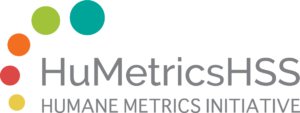“A critical component of our emerging #Humetrics conversation at Triangle SCI involves finding ways to expose, highlight, and recognize the important scholarship that goes into the all-too-hidden work of peer review, syllabus development, conference organizing, mentoring, etc. Our current metrics fail to capture what is most substantive about the rich life of scholarship we practice together in living academic communities.”
— Christopher Long, "Nurturing Fulfilling Scholarly Lives"
"We want to argue that there’s much more to scholarship than publishing regularly in high-impact journals," suggests my colleague Rebecca Kennison; indeed, we want to argue that there’s much more to scholarship than publishing. So how might the products and processes of scholarship writ large (from journal creation to peer review to organizing a conference to mentoring) be recognized and rewarded as scholarship? And how might they encourage practices that embody the five core values we saw as essential to the humanistic endeavor, rather than bolstering what Stacy Konkiel calls "corrosive values" such as bureaucracy, exclusivity, and competition? Shouldn’t we be rewarding practices that enrich the scholarly community rather than ones that detract from it?
On the last day of this week’s Triangle Scholarly Communication Institute, we tried to boil down all the brainstorming during team time, discussions over lunch, arguments over bourbon, subtweets, comments, and questions to a concrete example of what we mean by #Humetrics. We chose the syllabus as guinea pig: what questions could we ask ourselves about our syllabi to ensure that they, as objects, embody the values (Equity, Openness, Collegiality, Quality, and Community) and practices we want to encourage and reward in the humanities community? (I’ll just note here that the "we" and the "our" I mention currently represents our TriangleSCI team. But they’re a "we" and an "our" in need of expansion, so that they come to represent a constellation of scholarly communities in the humanities. This is partly why we’re working through our process publicly; we encourage anyone reading this to comment on that set of proposed values, to add to them, argue against them, and so on.)
Humanities Values: A List in Progress
 Some (non-exhaustive) examples, then, of the questions one might ask oneself about a syllabus:
Some (non-exhaustive) examples, then, of the questions one might ask oneself about a syllabus:
Equity: Am I including works by women? Am I including works by underrepresented groups? Am I attentive to diverse perspectives? Am I taking the cost of required course materials into consideration? Do I have a code of conduct? If online, is my syllabus ADA compliant?
Openness: Are there open access versions of the assigned material available? Do I assign a diverse range of materials, from books and blog posts to news articles and video? Is the syllabus itself openly available for others to consult, reuse, and remix?
Collegiality: Do my students have a safe space to speak? Am I encouraging constructive feedback? Does my code of conduct encourage kindness and generosity? Do I credit others’ work?
Quality: Does my syllabus reflect student or peer feedback from previous semesters? Does the syllabus push the boundaries of the discipline? Do I provide my students with a “general analytic framework with which to approach the corresponding readings and assignments”? (Thanks to Kevin Gannon for that last one, and to Donna Lanclos for pointing it out).
Community: Does my syllabus enable interdisciplinary conversation? Do I encourage engagement with the world outside the classroom (and the campus)?
If the objects and processes of our scholarship embody values that enrich our professional lives and our scholarly community, shouldn’t they be rewarded? Aren’t these a truer indication of excellence than any article download or citation count?
